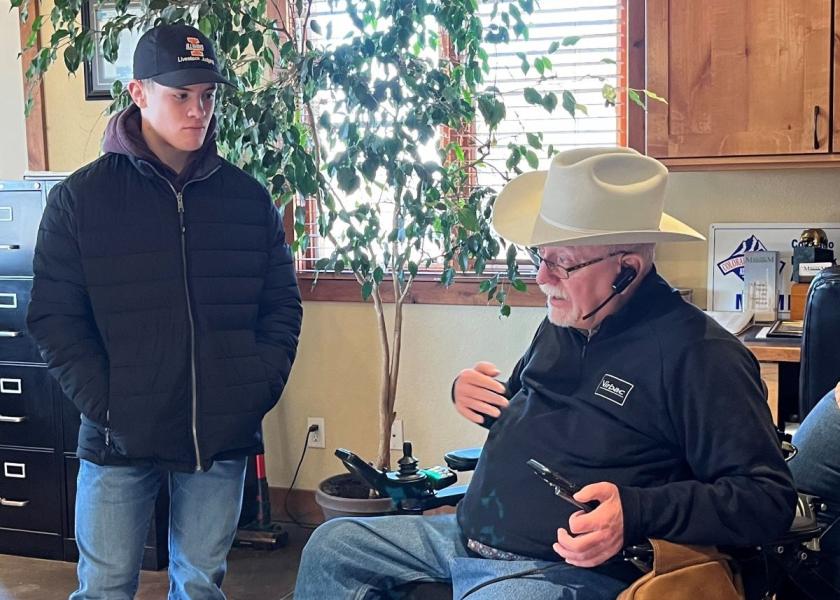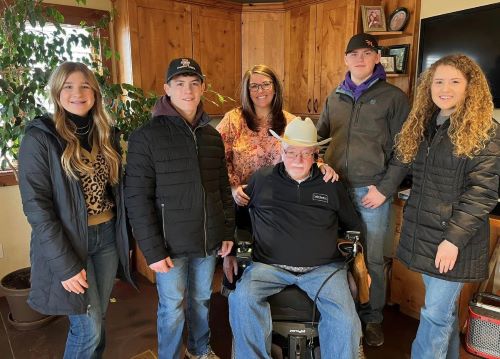Encourage the Next Generation to Chase Big Dreams

I instantly felt at ease when I walked into the office of Magnum Feedyard LLC and found myself surrounded by two of my passions: livestock and wrestling. In addition to being well known for their impressive cattle feedyard, the Gabel family is also well known for their love of wrestling.
We were traveling with our 4-H livestock judging team to Denver for the Western National Roundup and had just worked out on three great classes of feedlot cattle. The cattle were awesome, nobody busted a class, and the weather was chilly, but beautiful. As I stood there listening to Steve Gabel and his daughter Christie discuss the history of Magnum Feedyard, I was reminded once again of why I believe livestock judging is one of the greatest opportunities available for young people today.
It's the people.

Christie Gabel and Steve Gabel of Magnum Feedyard (center) with Champaign County 4-H livestock judging team members (l to r) Morgan Huls, Hunter Shike, Nolan Lee and Olivia Shike at Magnum Feedyard in Wiggins, Colo.
The connections you make along the way and the inspiration that can be gleaned are priceless. There is nothing like hearing the stories of industry giants who worked their way to the top. Steve shared how he got started in the business and what he’s learned.
Here are a few things that really resonated with me.
1. “Get up every morning, pull on your boots and work hard. The key to success is methodical grind.”
Methodical grind – an excellent description for what separates the best from the rest. There’s no question talent makes a difference when it comes to running a business, competing in a judging contest or stepping onto the wrestling mat. But what makes the biggest difference is commitment, the daily decision to choose to work hard and simply show up. Steve reminded us there aren’t many shortcuts in animal agriculture – so work hard instead.
However, we live in a world that wants to find the easier way. For example, in a recent "Land Your Ground" podcast with host Chase Burns, my brother-in-law David Shike sat in as the guest. David pointed out we’re probably all a little guilty of wanting to make things easier for our kids and the next generation. He said that his grandpa worked harder than his dad. And that his dad worked harder than him, and he’s likely worked harder than his kids.
But what’s the cost of “a little less work?” David said it worried him to see how things have changed in this country when it comes to work ethic.
2. “A lot of people say the cost barrier to enter agriculture today is too steep, but I argue it’s not.”
Steve believes there are many great opportunities in agriculture for young people willing to work hard and think outside of the box. He also said it’s about knowing the right people and being able to communicate with them.
One of the best things I learned from livestock judging was how to organize my thoughts to make a decision in a timely manner, and then back it up with solid logic. Then, I learned the value of sharing that with others. An idea or a reason for doing something is good, but it won’t go very far unless it’s communicated clearly.
Agriculture is more complicated than ever, and there’s no doubt that cost barrier is high. But Steve is quick to point out the cost is worth it.
3. “Every day I get to do a job I love.”
I admit this may not seem like an earth-shattering thought. But we live in a world where many people are motivated by money and power. It’s all too easy to lose sight of the value of truly enjoying what you do every day. When you enjoy your work, it rubs off on the people around you. When you don’t, it rubs off on the people around you.
Life isn’t predictable and sometimes the best laid plans fall apart. Don’t waste it spending time doing something you aren’t passionate about. When Steve talks about his feedlot, there’s no mistaking the sparkle in his eye, the excitement in his voice and the special connection it has created between him and his family. To see his children follow in his footsteps validates that his passion inspired them, too.
When we got back into the SUV and left the feedlot that afternoon, one of our kids piped up and said, “I think I want to buy a feedlot.” I smiled as I thought, “Job well done, Mr. Gabel.” What better impact can we make on the next generation than encouraging them to chase after big dreams and empower them with skills to help them get there?
I know he likely won’t buy a feedlot someday, but you never know.
Read More:
How 20 Voices Spoke Up for the Pork Industry in 2023
A Humble Leader: How Paul Sundberg Moved the Needle in Swine Health







